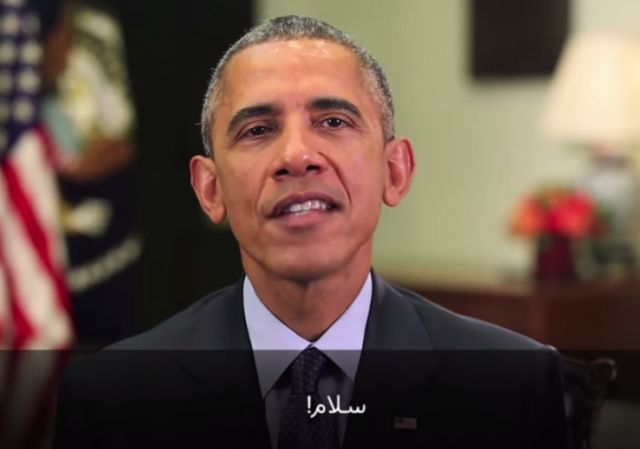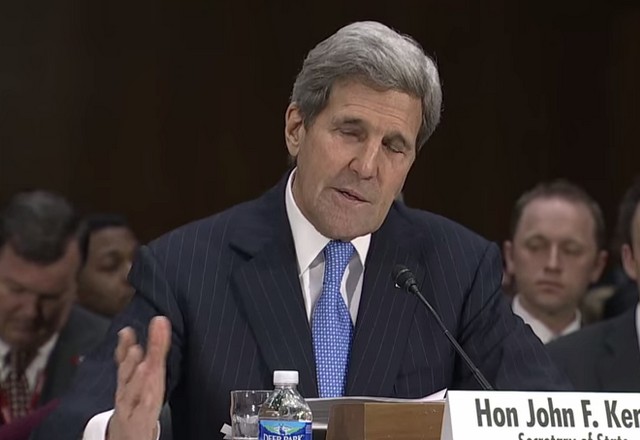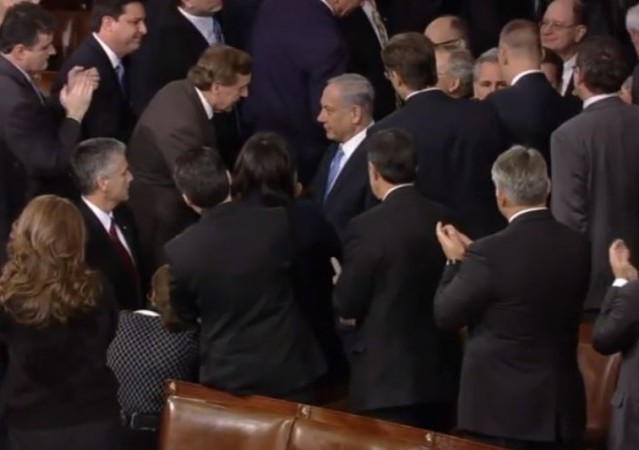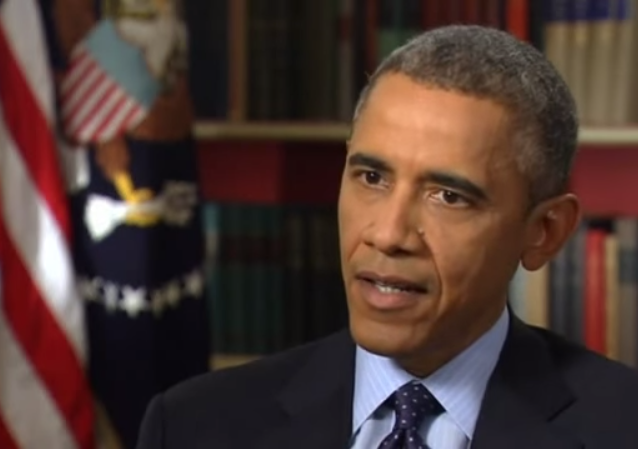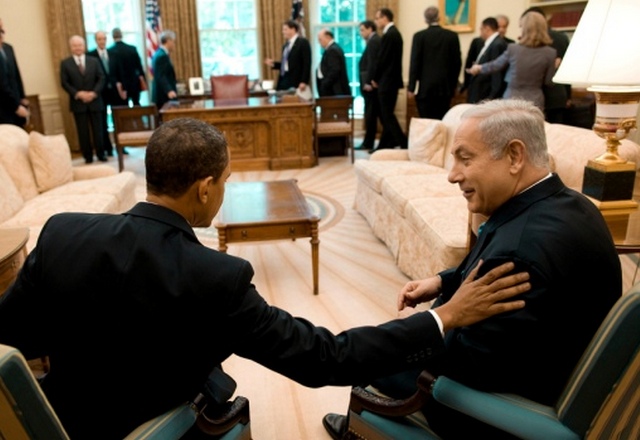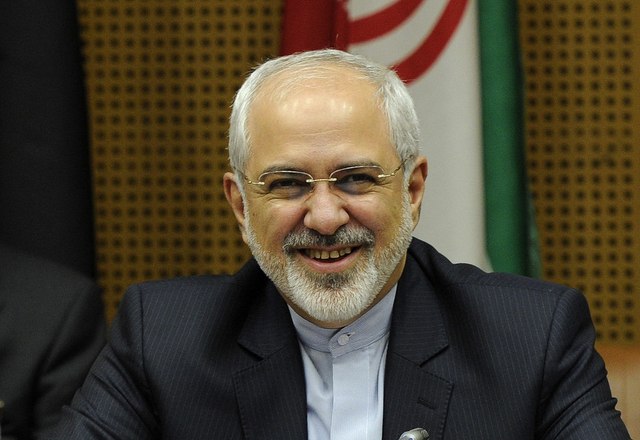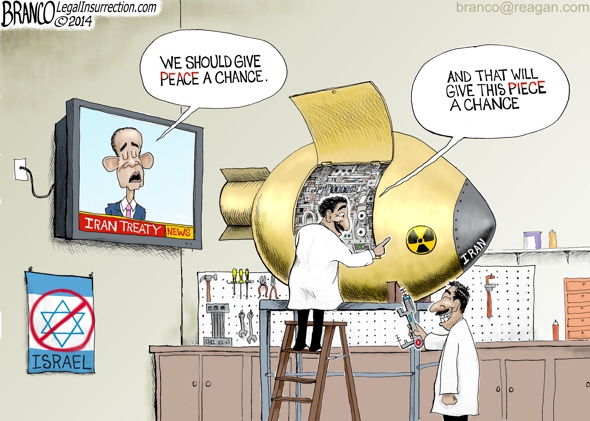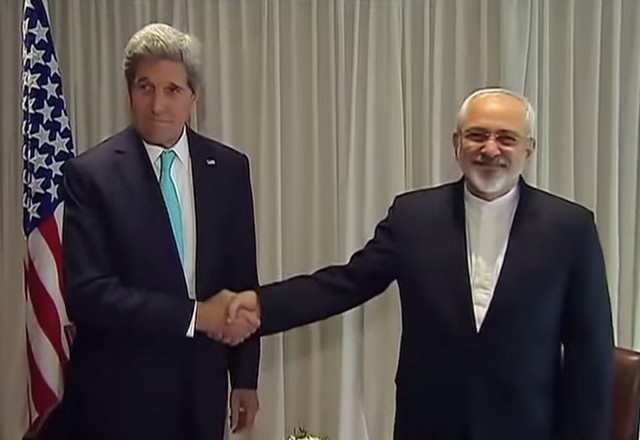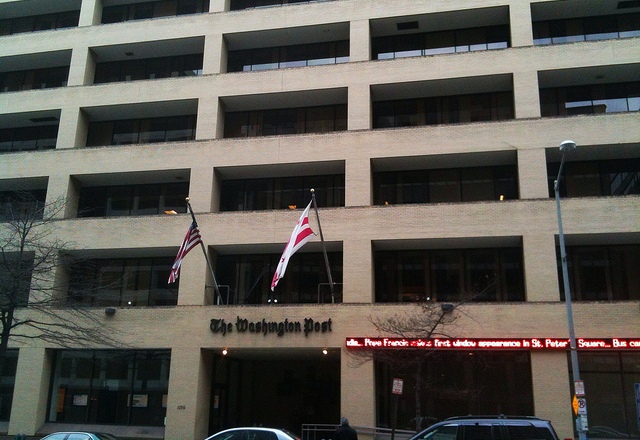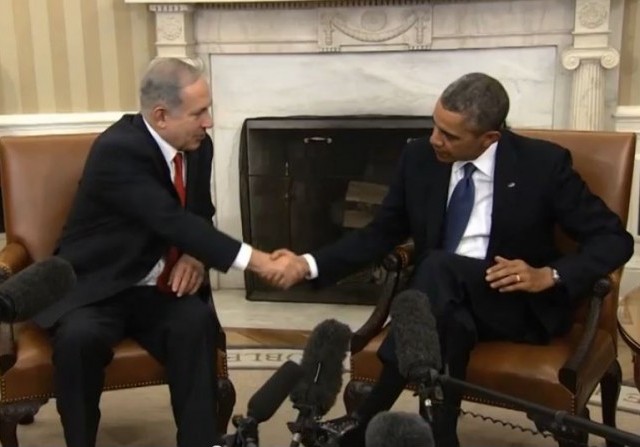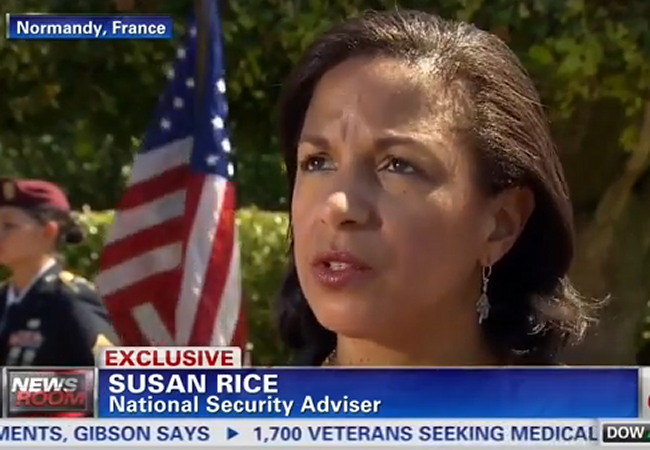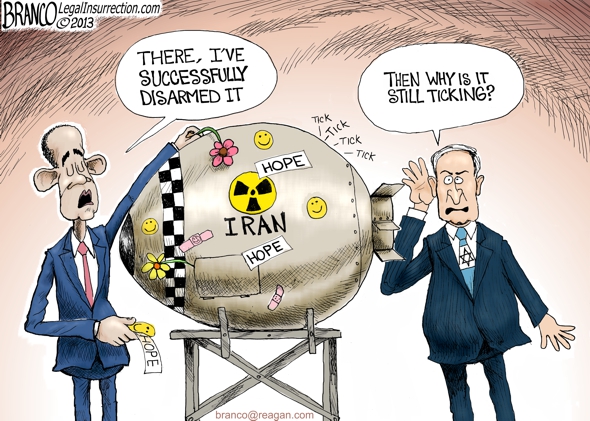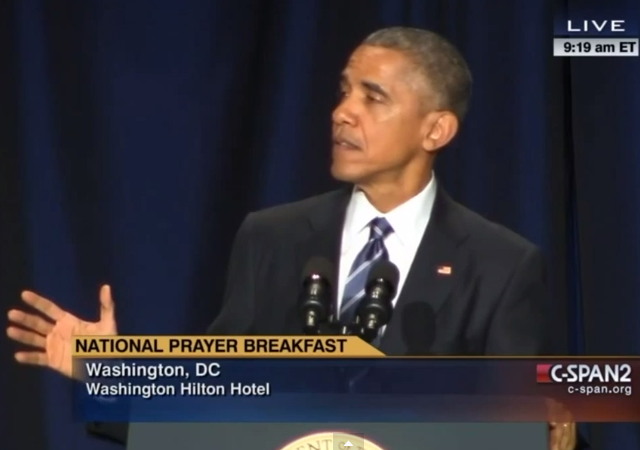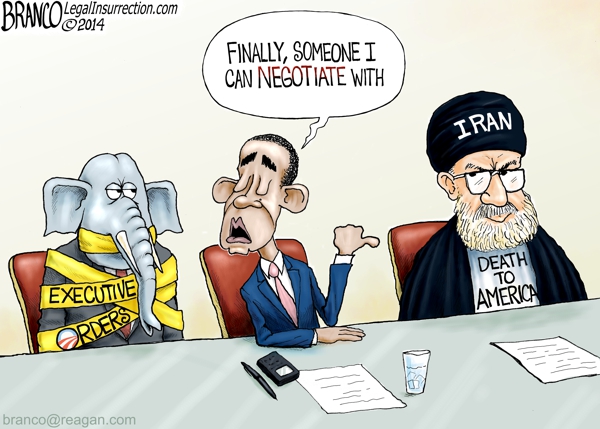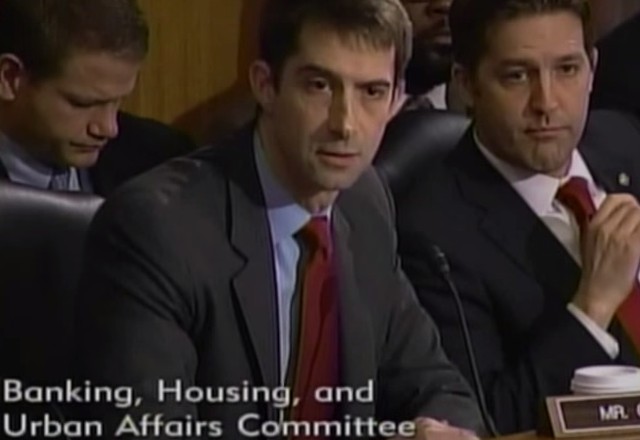Obama Foreign Policy Tag
After Israeli Election, Will Obama Party Like It’s 1999?
Posted by David Gerstman
on March 17, 2015
3 Comments
Charles Krauthammer began a 1999 column like this:
Having failed to topple Saddam Hussein or Slobodan Milosevic, Bill Clinton had to settle for Benjamin Netanyahu. In a characteristic display of partisan glee, Clinton toasted political consultant Robert Shrum on Tuesday night (reports Lloyd Grove in The Washington Post) to congratulate him (and implicitly, the administration) for helping the Israeli opposition bring down the prime minister Washington loves to hate.Later today, if all the votes in the Israeli election are counted and the State Department-supported anti-Netanyahu group is successful in ensuring that Netanyahu is not able to form the next government, who will President Obama be toasting? True this is hypothetical question, but there's a lesson in 1999, that is relevant today. Clinton figured that once Netanyahu was out of the way he no longer had any obstacles to Middle East peace and a Nobel Peace Prize. He worked well with Ehud Barak and a year after Barak took office hosted a summit at which Barak offered a peace deal to Yasser Arafat. Arafat rejected it and two months later launched the second or Al-Aqsa intifada in which 1,100 Israelis were killed. So yes, Clinton got his wish and hundreds of Israelis paid the price.
Cotton Letter Smokes Out Dangerous Concession to Iran
Posted by David Gerstman
on March 16, 2015
15 Comments
The Wall Street Journal reported yesterday (Google link) that Secretary of State John Kerry is still upset about the open letter Sen. Tom Cotton (R - Ark.) wrote last week that was signed by 46 other Republican senators arguing that it was Congress' role to review treaties.
Mr. Kerry said on Saturday in Egypt that these American lawmakers were “wrong.” “It is almost inevitable it will raise questions in the minds of the folks with whom we’re negotiating as to whether or not they are negotiating with the executive department and the president, which is what the constitution says, or whether there are 535 members of Congress,” Mr. Kerry told reporters in the Red Sea resort of Sharm el-Sheikh. “Let me make clear to Iran…that from our point of view, this letter is incorrect in its statements,” he added. “As far as we are concerned, the Congress has no ability to change an executive agreement.”It strikes me as odd that Kerry is doubling down on his non-binding argument. An executive agreement is not binding, unlike a treaty, and therefore not subject to Congressional review. It's also odd that he claims, "as far as we are concerned." Shouldn't the Constitution be the standard by which the Republican claims are judged? Finally, there's Kerry's famous declaration at the time the Joint Plan of Action was signed in November 2013 that the agreement was not based on trust. So if the agreement is not based on trust and it's non-binding what "mechanism" will there to be verify that Iran isn't overtly or covertly pursuing an illicit nuclear program? More and more I'm convinced that Cotton's reason for writing the letter was to smoke out the administration on this point.
If Bibi loses, can Israel resist Obama’s regional goals?
Posted by Miriam Elman
on March 15, 2015
12 Comments
On Tuesday Israel’s people will elect the 34th government of their country’s short 67 year history.
PM Benjamin (Bibi) Netanyahu’s bid for reelection once looked rock solid, his Likud party guaranteed to come out ahead of the pack.
Now, his political future is hanging on a thread.
His main rival, the Zionist Union—a new party with a pretentious-sounding name (as if only Isaac (Buji) Herzog and Tzipi Livni are the true Zionist heirs)—now has a considerable four seat edge in final media polls released on Friday.
A four day legally required moratorium on polling has kicked in, so that’ll be the best guess until the election returns start coming in on Tuesday night.
Netanyahu is feeling the heat. Last Thursday he acknowledged that there’s a “real danger” he’ll be ousted if the Likud can’t close the gap. He’s already indicated that he’ll resign as party leader and withdraw from political life if the Likud ends up with less than 18 seats.
This would be a tragic career finish for someone who in the last few months has done so much to advance the cause of Israel and the Jewish people, the Middle East region, and the free world.
Obama Launches Preemptive Interview on Bibi Speech
Posted by David Gerstman
on March 03, 2015
16 Comments
In an interview with Reuters published yesterday, President Obama launched a pre-emptive strike against Israeli Prime Minister Benjamin Netanyahu's planned speech before a session of Congress. I won't attempt to fisk the whole thing, but a few things stuck out as patently false.
Now keep in mind the prime minister, when we signed up for this interim deal that would essentially freeze Iran’s program, roll back its highly enriched uranium - its 20 percent highly enriched uranium - and so reduce the possibility that Iran might breakout while we were engaged in these negotiations, when we first announced this interim a deal, Prime Minister Netanyahu made all sorts of claims. This was going to be a terrible deal. This was going to result in Iran getting 50 billion dollars worth of relief. Iran would not abide by the agreement. None of that has come true.I'm not sure that Netanyahu made a claim of $50 billion in sanctions relief. I believe the number was closer to $20 billion and that the actual relief Iran got was closer to the Israeli estimate than the administration's lowball estimate. But I don't have the time right now to research this, but I'm skeptical about this claim.
Administration Attacks on Bibi Spur Bipartisan Support for Israel
Posted by David Gerstman
on March 01, 2015
28 Comments
The administration continues in its attempt to marginalize Prime Minister Netanyahu ahead of his speech on Iran. And the efforts appear to be backfiring.
Jeffrey Goldberg tells some important truths in today's column, Danger Ahead for Obama on Iran:
I’m fairly sure Netanyahu will deliver a powerful speech, in part because he is eloquent in English and forceful in presentation. But there is another reason this speech may be strong: Netanyahu has a credible case to make. Any nuclear agreement that allows Iran to maintain a native uranium-enrichment capability is a dicey proposition; in fact, any agreement at all with an empire-building, Assad-sponsoring, Yemen-conquering, Israel-loathing, theocratic terror regime is a dicey proposition. The deal that seems to be taking shape right now does not fill me—or many others who support a diplomatic solution to this crisis—with confidence. Reports suggest that the prospective agreement will legitimate Iran’s right to enrich uranium (a “right” that doesn’t actually exist in international law); it will allow Iran to maintain many thousands of operating centrifuges; and it will lapse after 10 or 15 years, at which point Iran would theoretically be free to go nuclear. (The matter of the sunset clause worries me, but I’m more worried that the Iranians will find a way to cheat their way out of the agreement even before the sun is scheduled to set.) ... This is a very dangerous moment for Obama and for the world. He has made many promises, and if he fails to keep them—if he inadvertently (or, God forbid, advertently) sets Iran on the path to the nuclear threshold, he will be forever remembered as the president who sparked a nuclear-arms race in the world’s most volatile region, and for breaking a decades-old promise to Israel that the United States would defend its existence and viability as the nation-state of the Jewish people.And as Goldberg noted, three years ago Obama promised in one of Goldberg's columns, “We’ve got Israel’s back.”
The New York Times Cheers On A Nuclear Iran
Posted by David Gerstman
on February 27, 2015
16 Comments
Yesterday's New York Times editorial on the emerging nuclear deal between the West and Iran is completely delusional. I will try to tackle the editorial's arguments in the order of ridiculousness, from most to least:
Critics of any deal — including those in Congress, such as Senator Mark Kirk, a Republican of Illinois, and Senator Robert Menendez, a Democrat of New Jersey; and Prime Minister Benjamin Netanyahu of Israel — demand complete dismantlement of Iran’s program given the country’s history of lying about its efforts to produce nuclear fuel and pursue other weapons-related activities. But their desired outcome simply cannot be achieved. President George W. Bush wasn’t able to secure that goal in 2003 when Iran had only a few dozen centrifuges, the machines that enrich uranium for nuclear fuel. Now, 12 years later, Iran has an estimated 19,000 centrifuges, not to mention scores of other facilities, including some that have been hardened to withstand a military attack.Hold on. This is saying that a miscreant gets to determine the level of his punishment. We can't get Iran down to zero centrifuges because Iran refuses to dismantle them. This is just saying we don't have the political will to demand such a result. We haven't been able to secure that result is because we haven't tried. Certainly if we say we're going allow 6,000 or 6,500 centrifuges we're not going to get zero. But given Iran's "history of lying" we also don't know how many undeclared centrifuges it might have either. To give Iran veto power over how many centrifuges it gets to keep operating, considering its "history of lying," means that we'll be enabling it to enrich enough uranium for a nuclear bomb.
The pending Iran deal
Posted by New Neo
on February 26, 2015
16 Comments
From the headline of this AP article, "Historic US-Iran nuclear deal could be taking shape," the casual reader would be hard-pressed to tell whether the deal was good, bad, or indifferent for the US. The article goes on to offer the usual quotes alternating between those who laud the potential agreement and those who criticize it, and closes on a note of optimism about the talks and sympathy for Iran:
Daryl Kimball of the Washington-based Arms Control Association said that with the IAEA's additional monitoring, the deal taking shape leaves "more than enough time to detect and disrupt any effort to pursue nuclear weapons in the future." In exchange, Iran wants relief from sanctions crippling its economy and the U.S. is talking about phasing in such measures.Contrast that with this piece by David Horovitz in The Times of Israel. He observes that, although the Obama administration has been engaged in denying Israeli rumors of what might be in the agreement and accusing Israel of "misrepresenting the specifics for narrow political ends," the pending agreement that the AP article describes not only contains many of the things Israel had been complaining about, but is even worse than was previously thought. According to Israel’s "most respected Middle East affairs analyst," Ehud Ya’ari, the deal would be likely to have some catastrophic consequences:
A Test Iran Is Sure to Pass
Posted by David Gerstman
on February 25, 2015
8 Comments
At a Senate Appropriations Committee Hearing yesterday, Secretary of State John Kerry took aim at critics of the Obama administration's posture towards Iran:
World powers grouped under the so-called P5+1 “had made inroads” since reaching an interim deal with Iran in November 2013 on reining in its suspect nuclear program, Kerry said. “We’ve gained unprecedented insight into it,” Kerry told the Senate appropriations committee at the start of two days of intense congressional foreign policy budget hearings. ... Taking aim at critics, such as official Israel, that are opposed to the agreement, Kerry said they did not “know what the deal is.” “I caution people to wait and see what these negotiations produce. Since 2013, we have been testing whether or we can achieve that goal diplomatically — I don’t know yet,” Kerry insisted.Testing? 15 months after the P5+1 nations agreed to the Joint Plan of Action (JPOA), the administration is still "testing?" Here's one thing we know. The JPOA (.pdf) required this:
A Joint Commission of E3/EU+3 and Iran will be established to monitor the implementation of the near-term measures and address issues that may arise, with the IAEA responsible for verification of nuclear-related measures. The Joint Commission will work with the IAEA to facilitate resolution of past and present issues of concern.
White House Struggling to Sell Iran Policy…to Democrats
Posted by David Gerstman
on February 22, 2015
13 Comments
An effort last week to marshal Congressional Democrats to urge House Speaker John Boehner to delay Israeli Prime Minister Benjamin Netanyahu's Congressional speech next month gained the support of only 23 out of 188 House Democrats. There is more than one way to explain this. Here's administration defender Greg Sargent of The Washington Post.
Some House Democrats have circulated a letter calling on House Speaker John Boehner to delay the speech, on the grounds that it represents a partisan effort by Republicans to enlist the help of a foreign leader in scuttling one of the President’s chief foreign policy goals, i.e., reaching a nuclear deal with Iran, which Netanyahu bitterly opposes. ... All in all, the failure of more Democrats to sign this letter suggests many still fear the politics of appearing out of sync with whatever Israel wants. It’s true that a number of Democrats have said they will skip the speech. But many of those have clarified that this isn’t due to any organized boycott, and far more are attending. And, really, all the talk of a “boycott” is misdirection. It shouldn’t be all that difficult for Democrats to call for a mere delay in this speech, while rebuffing efforts to portray such a move as “anti-Israel,” given how egregious the circumstances surrounding this event really are.(It's important to note that Sargent quotes a poll showing that most Americans are unhappy with the way the invitation was extended - i.e. dissatisfaction with Boehner's actions, other polls show strong American support for Netanyahu speaking.) Not surprisingly Sargent uses his cherry-picked data point to point out the the big bad Israel lobby as the culprit.(In blaming the pro-Israel lobby, Sargent took a page from the playbook of President Obama who, last month, according to The New York Times, effectively accused Sen. Robert Menendez of not loving his country enough, "The president said he understood the pressures that senators face from donors and others, but he urged the lawmakers to take the long view rather than make a move for short-term political gain, according to the senator.")
Obama’s Concessions to Iran Alienating Allies
Posted by David Gerstman
on February 17, 2015
7 Comments
Last week, Prof. Jacobson noted that The Washington Post published an editorial criticizing President Obama's handling of the nuclear negotiations with Iran. Prof. Jacobson's mentioned the editorial in the context of arguing that the likely deal is against "the best interests of the American people."
But there's something else remarkable about the editorial. It was the fifth one since October in which the Post questioned the concessions being made by the P5+1 nations; and several of the central points of the editorial were buttressed by Sen. Tim Kaine (D - Va.), so they could hardly be called partisan. To quote from the editorial:
A related problem is whether Iran could be prevented from cheating on any arrangement and acquiring a bomb by stealth. Mr. Kaine (D) underlined that an attempt by the United States to negotiate the end of North Korea’s nuclear program failed after the regime covertly expanded its facilities. With Iran, said Mr. Kaine, “a nation that has proven to be very untrustworthy . . . the end result is more likely to be a North Korean situation” if existing infrastructure is not dismantled. The administration at one time portrayed the nuclear negotiations as distinct from the problem of Iran’s sponsorship of terrorism, its attempts to establish hegemony over the Arab Middle East and its declared goal of eliminating Israel. Yet while the talks have proceeded, Mr. Obama has offered assurances to Supreme Leader Ayatollah Ali Khamenei that the two countries have shared interests in the region, and the White House has avoided actions Iran might perceive as hostile — such as supporting military action against the Syrian regime of Bashar al-Assad.
Which should Israel fear most – Obama’s temper or Iran’s nukes?
Posted by William A. Jacobson
on February 08, 2015
27 Comments
Bibi Netanyahu is just the messenger of the reality of a dangerous nuke deal....
Obama’s new National Security Plan = Social Justice War
Posted by Mike LaChance
on February 07, 2015
28 Comments
As all hell breaks loose across the Middle East, another member of the Obama administration is focusing on the important issues.
Fred Lucas of The Blaze reported:
Susan Rice Calls for Climate Action, LGBT Equality in National Security Plan National Security Advisor Susan Rice said the United States must take a longer view on national security, in a speech that focused as much on gender and LGBT equality and climate change as Islamic State terrorism and Russian aggression. “The issues is not simply about when we should have started arming the Syrian rebels or whether we should provide lethal assistance to Ukraine,” Rice said in a speech to the Brookings Institution when introducing President Barack Obama’s 2015 National Security Strategy. “It’s about the nature of U.S. leadership for the future. With this national security strategy, we stake out a much larger role for America in shaping the world while anticipating the challenges to come.”... She went on to frame the national security aspects of climate change, which she said the administration is addressing with its “groundbreaking climate commitment with China.” “American leadership is addressing the very real threat of climate change. The science is clear,” she said. “The impacts of climate change will only worsen over time. Even longer droughts, more severe storms, more forced migration.”...
“the Israeli government doesn’t — and shouldn’t — listen to them”
Posted by William A. Jacobson
on February 07, 2015
4 Comments
Going through some old bookmarks I never wrote about, I found Israel’s Fair-Weather Fans, an August 7, 2014, NY Times Op-Ed by Shmuel Rosner. The column is a rebuttal to liberal Jewish American critics worrying about the alienation of liberal American Jews from Israel.
It seems relevant today, as some Democrats put Barack Obama's alleged hurt feelings ahead of the legitimate security concerns of our friends, from Israel to the Gulf Arab states, over Iranian nuclear and regional ambitions:
Two prominent black Democrats in the House of Representatives are vowing to skip Prime Minister Benjamin Netanyahu's speech to Congress next month, a move that a White House insider says was put in motion by the Obama administration. John Lewis of Georgia and G.K. Butterfield of North Carolina both said Friday that they disapproved when House Speaker John Boehner invited the Israeli leader to address a joint session of Congress on March 3 without consulting President Barack Obama first.
Democrats have a choice, but it’s not Bibi versus Barack
Posted by William A. Jacobson
on February 06, 2015
12 Comments
It all is proceeding as planned.
A nuke deal with Iran, with the quid pro quo of assisting Iran's expansion into a regional power, is working its way forward. For that, Iran gets to keep most of its nuclear program, because it likes it.
There are two things standing in the way: (1) Congress, and (2) Bibi Netanyahu's persuasive powers.
The Obama administration needs to get rid of both, and it has seized on the opportunity of John Boehner's invitation to Netanyahu to speak before Congress as the tool to accomplish that mission.
The White House spun a false tale through anonymous administration comments to reporters, that the invitation was a breach of protocol and that the White House was blindsided. Separately, the White House has been attacking the Israeli Ambassador Ron Dermer as the supposed mastermind. In fact, Boehner came up with the idea, approached the Ambassador, conveyed that Boehner would notify the White House of the invitation (which he did), and Netanyahu did not accept until after the White House was notified.
The false narrative spread by Obama's operatives has the goal of pulling Democrats away from opposing a nuke deal and attending Netanyahu's speech, by forcing a false choice of Obama or Netanyahu. The third choice -- what is best for America in keeping nukes out of the hands of a regime that still calls us the Great Satan and chants Death unto U.S. -- is not on the table.
Obama puts his own cult of personality before anything. I don't believe that he's sincerely offended; he's just not going to let a manufactured crisis go to waste.
Interesting thing is, the Editorial Board of The Washington Post pretty much shares Netanyahu's concerns about an impending bad deal, and stands against Obama's attempt to shut Congress out of the process, The emerging Iran nuclear deal raises major concerns:
Obama: I’ll meet your ISIS, and raise you The Crusades
Posted by Mike LaChance
on February 06, 2015
57 Comments
At the National Prayer Breakfast yesterday, President Obama equated the horrific acts carried out by ISIS to the Christian Crusades.
Nedra Pickler of AP News reported:
Obama condemns those who seek to 'hijack religion' President Barack Obama on Thursday condemned those who seek to use religion as a rationale for carrying out violence around the world, declaring that "no god condones terror." "We are summoned to push back against those who would distort our religion for their nihilistic ends," Obama said during remarks at the National Prayer Breakfast. He singled out the Islamic State group in Iraq and Syria, calling the militants a "death cult," as well as those responsible for last month's terror attacks in Paris and deadly assault on a school in Pakistan... Obama had a more non-denominational message for the audience that also included prominent leaders of non-Christian faiths. The president said that while religion is a source for good around the world, people of all faiths have been willing to "hijack religion for their own murderous ends." "Unless we get on our high horse and think that this is unique to some other place, remember that during the Crusades and Inquisition, people committed terrible deeds in the name of Christ," Obama said. "In our home country, slavery and Jim Crow all too often was justified in the name of Christ. "So it is not unique to one group or one religion," Obama said. "There is a tendency in us, a simple tendency that can pervert and distort our faith."Charles Krauthammer reacted on Special Report. Video via National Review:
The method to Obama’s foreign policy madness
Posted by New Neo
on February 04, 2015
11 Comments
Ever wonder whether Obama's policy towards Iran represents something coherent, or just naive incompetence? Here's an excellent article by Michael Doran in Mosaic that fleshes out the details of a theory about Obama's approach to Iran. It doesn't take the most extreme stance of all---which would be the "Obama is a secret Iranian sympathizer" theory---but the piece's premise is credible, and it is well worth taking the time to read in its entirety.
It's a bit difficult to summarize, but the article makes several points. The first two are that much of Obama's approach focuses on his deep contempt for Bush and his powerful desire to differentiate himself, as well as Obama's general penchant for secrecy. But there's much more:
During the Bush years, an elaborate myth had developed according to which the mullahs in Tehran had themselves reached out in friendship to Washington, offering a “grand bargain”: a deal on everything from regional security to nuclear weapons. The swaggering Bush, however, had slapped away the outstretched Iranian hand, squandering the opportunity of a lifetime... Obama based his policy of outreach to Tehran on two key assumptions of the grand-bargain myth: that Tehran and Washington were natural allies, and that Washington itself was the primary cause of the enmity between the two. If only the United States were to adopt a less belligerent posture, so the thinking went, Iran would reciprocate. In his very first television interview from the White House, Obama announced his desire to talk to the Iranians, to see “where there are potential avenues for progress.” Echoing his inaugural address, he said, “[I]f countries like Iran are willing to unclench their fist, they will find an extended hand from us.” Unfortunately, the Supreme Leader of Iran, Ali Khamenei, ignored the president’s invitation...Because, of course, the entire thing was a myth.
Tom Cotton takes a hard stance on Iran
Posted by David Gerstman
on February 01, 2015
3 Comments
I wasn't looking for anything more than a screenshot when I came across Senator Tom Cotton's (R-Ark.) statement last week (embedded below) before the Senate Banking Committee. But when I heard him speak about Iran's "...nasty habit with their proxies of killing Jews all around the world." I made a mental note of the statement and went back later.
The statement was part of a larger argument against the nuclear negotiations with Iran, but what Cotton was establishing in stark terms is that Iran is America's enemy. The enmity can be seen not only by its words but by its actions too:
"Iran is a radical Islamist theocracy whose constitution calls for jihad and its leaders have honored that constitution for 35 years, killing Americans in 1983, killing Americans in 1996 ... having a nasty habit with their proxies of killing Jews all around the world, in Argentina, in Bulgaria, in Israel and most recently, controlling or exerting dominant influence over 5 different capitals in the Middle East, Tehran, Baghdad, Damascus, Beirut, and now, Sanaa..."I assume this was a summary of the more extended argument Cotton made Friday in an op-ed published in The Wall Street Journal (Google link). After referring to Iran as America's "negotiating 'partner'" Cotton wrote:
DONATE
Donations tax deductible
to the full extent allowed by law.
CONTRIBUTORS
- William A. Jacobson
Founder
- Kemberlee Kaye
Sr. Contrib Editor
- Mary Chastain
Contrib Editor
- Mike LaChance
Higher Ed
- Leslie Eastman
Author
- Vijeta Uniyal
Author
- Stacey Matthews
Author
- Jane Coleman
Author
- Ben Smith
Weekend Editor
- Elizabeth Stauffer
Author
- Mandy Nagy
Editor Emerita
- Learn more about the Contributors


